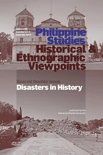
Philippine Studies-Historical and Ethnographic Viewpoints
Scope & Guideline
Cultivating Knowledge through Rigorous Historical Inquiry
Introduction
Aims and Scopes
- Historical Analysis:
The journal emphasizes historical perspectives, examining significant events, figures, and movements that have shaped the Philippines, such as colonialism, revolution, and contemporary political dynamics. - Cultural Studies:
It investigates the rich tapestry of Filipino culture, including literature, arts, and indigenous practices, contributing to a deeper understanding of cultural identity and expression in the Philippines. - Disaster and Climate Studies:
A significant focus on disaster justice and climate change, analyzing the socio-political implications of natural disasters in the Philippines and exploring frameworks for equitable recovery and resilience. - Ethnographic Perspectives:
The journal incorporates ethnographic methodologies to provide insights into the lived experiences of various communities, highlighting the intersection of local practices with broader socio-political contexts. - Policy Analysis:
Critical examinations of Philippine policies, especially in relation to disaster management, cultural preservation, and social justice, are prevalent, encouraging scholarly discourse on governance and community engagement.
Trending and Emerging
- Disaster Justice and Resilience:
Recent publications increasingly address the concept of disaster justice, examining the interplay between environmental disasters and social equity, which is critical in the context of climate change and its impact on vulnerable communities. - Cultural Identity and Language Practices:
There is a growing interest in how cultural identity is negotiated through language use, particularly among marginalized groups, indicating an emerging focus on linguistic diversity and its implications for social cohesion. - Political Critique and Social Movements:
A notable trend is the critical examination of political movements and their historical contexts, particularly in relation to contemporary governance and social activism, reflecting a robust engagement with the political landscape. - Interdisciplinary Approaches:
The journal is increasingly embracing interdisciplinary methodologies, integrating perspectives from sociology, anthropology, and environmental studies, which enriches the analysis of Philippine societal issues.
Declining or Waning
- Colonial Studies:
Although colonial history remains a core focus, there has been a noticeable decline in papers specifically addressing colonial administrative practices and their immediate impacts, suggesting a shift towards more contemporary issues. - Traditional Ethnographies:
Research centered on traditional ethnographic studies of indigenous groups has seen a decrease, possibly due to a growing emphasis on modern socio-political issues and disaster contexts. - Historical Biographies:
While biographies of historical figures have been published, this theme has waned, indicating a transition toward collective histories and broader social movements rather than individual narratives.
Similar Journals

Novye Issledovaniya Tuvy-New Research of Tuva
Advancing Knowledge in Anthropology and Cultural StudiesNovye Issledovaniya Tuvy-New Research of Tuva is a prominent open-access journal published by CH K LAMAZHAA since 2009, dedicated to advancing the fields of Anthropology, Cultural Studies, and History. With an impressive Q1 ranking in these disciplines and a robust presence in the Scopus database—ranking 65th in History and achieving a 96th percentile in Anthropology—it serves as an essential platform for researchers and scholars seeking to explore and disseminate new insights regarding the diverse cultural heritage and historical context of the Tuva region in the Russian Federation. The journal is committed to providing accessible, high-quality research, ensuring that vital information reaches a wide audience without barriers. By spanning the years 2016 to 2024, Novye Issledovaniya Tuvy not only reflects contemporary developments but also contributes significantly to the global discourse on cultural identity and historical narratives.

AMERICAN ETHNOLOGIST
Exploring the Depths of Cultural DynamicsAMERICAN ETHNOLOGIST, published by Wiley, stands as a prominent platform in the field of anthropology, with a distinguished reputation underscored by its Q1 ranking in the 2023 Category Quartiles and a notable position in the 79th percentile among its peers. With its foundation dating back to 1974 and set to continue until 2024, this journal serves as a vital resource for researchers, practitioners, and students devoted to exploring cultural dynamics and social practices across diverse communities. The journal is characterized by its commitment to advancing theoretical discussions and empirical scholarship in ethnology and related disciplines. Targeted contributions include in-depth studies, critical reviews, and innovative methodologies that engage with pressing cultural issues. Although it does not offer Open Access, the journal’s rigorous peer-review process and high-impact articles ensure the dissemination of valuable insights, enhancing scholarly engagement and professional discourse. Its ISSN is 0094-0496 and E-ISSN is 1548-1425, emphasizing its dual format accessibility, which facilitates wider readership within the anthropology community.
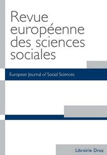
Revue Europeenne des Sciences Sociales
Nurturing Academic Discourse in the Heart of EuropeRevue Europeenne des Sciences Sociales, published by LIBRAIRIE DROZ SA, is a vital platform in the field of social sciences, offering a distinct focus on European social research and interdisciplinary studies. The journal, with ISSN 0048-8046 and E-ISSN 1663-4446, has been a valuable resource since its inception, covering significant themes and fostering on-going discussions in European social contexts. Although indexed coverage in Scopus has been discontinued since 2016, the journal maintains its scholarly importance, aiming to present rigorous analyses and innovative perspectives that stimulate academic discourse and contribute to a more profound understanding of social phenomena. Researchers, professionals, and students alike are encouraged to explore the journal for its rich insights and comprehensive studies that reflect the complexities of contemporary European societies.
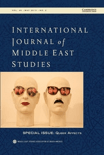
INTERNATIONAL JOURNAL OF MIDDLE EAST STUDIES
Bridging Past and Present in Middle Eastern ScholarshipInternational Journal of Middle East Studies, published by Cambridge University Press, is a leading scholarly platform dedicated to advancing the study of the Middle East within the realms of History, Sociology, and Political Science. Since its inception in 1970, the journal has consistently provided researchers and scholars with a critical forum for innovative research and significant discourse, boasting a 2023 Q1 ranking in History and impressive percentile rankings in related disciplines. Although it operates under a traditional publishing model, it reaches a global audience through its well-curated articles that bridge the gap between historical contexts and contemporary issues in the Middle East. Recognized for its scholarly rigor, the journal has a dedicated readership, making it an invaluable resource for anyone engaging deeply with the socio-political dynamics and historical narratives of this pivotal region.
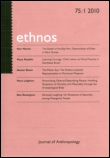
ETHNOS
Shaping Narratives, Enriching DiscoursesETHNOS is a leading journal published by Routledge Journals, Taylor & Francis Ltd, dedicated to advancing the field of anthropology and archaeology. With an impressive impact factor reflected in its high Scopus rankings—#23 in Archaeology and #44 in Anthropology—the journal is recognized for its rigorous scholarship and its influence on contemporary discussions in social science. Operating since 1936, ETHNOS provides a vital platform for innovative research and theoretical discourse, making it an essential resource for professionals, academics, and students alike. Although it does not offer Open Access, its meticulous editorial standards and Q1 classification in both Anthropology and Archaeology guarantee substantive contributions to the study of culture and society. Located in the United Kingdom, the journal continues to shape the narratives surrounding social and cultural phenomena, enriching the academic landscape up to 2024 and beyond.

Anthropology in Action-Journal for Applied Anthropology in Policy and Practice
Transforming Insights into Actionable ChangeAnthropology in Action - Journal for Applied Anthropology in Policy and Practice, published by BERGHAHN JOURNALS, stands as a pivotal resource within the field of applied anthropology, addressing vital issues at the intersection of cultural insights and policy development. With an impressive Q1 ranking in Anthropology and a noteworthy position in the Scopus Ranks (Rank #70 of 502), this journal has solidified its influence as a premier platform for scholars and practitioners seeking to engage with contemporary societal challenges through a rigorous anthropological lens. Since becoming Open Access in 2018, the journal has enhanced accessibility to its rich array of scholarly articles, making critical research findings available to a broader audience. Covering a spectrum of topics from community practice to inform policy-making, Anthropology in Action aims to foster cross-disciplinary dialogue and promote the practical application of anthropological insights for real-world change. Whether you are a researcher, policymaker, or student, this journal serves as an essential navigational tool in the evolving landscape of applied anthropology.

Revista de Etnografie si Folclor-Journal of Ethnography and Folklore
Exploring Cultural Narratives, Unveiling Ethnographic InsightsRevista de Etnografie si Folclor-Journal of Ethnography and Folklore, an esteemed publication by EDITURA ACAD ROMANE, serves as a vital platform for the dissemination of research and scholarship in the fields of anthropology and cultural studies. Established in Romania, this journal has committed itself to exploring the rich tapestry of ethnographic practices and folklore traditions, favoring interdisciplinary approaches that illuminate the diverse cultural heritage of societies. With an ISSN of 0034-8198, the journal has been instrumental in fostering academic dialogue and engaging researchers, professionals, and students alike. Though currently classified in the Q4 category of both anthropology and cultural studies, its continued growth from 2014 to 2024 signals an evolving contribution to understanding cultural dynamics. Accessible via traditional publication means, the journal encourages contributions that deepen the understanding of ethnographic methodologies and cultural narratives, thereby enriching the academic landscape.

Bresil-s
Showcasing Multidisciplinary Research on Brazil's EvolutionBresil-s is a premier scholarly journal dedicated to the multidisciplinary exploration of Brazilian studies, encompassing socio-economic, political, and cultural dimensions. Published by the Ecole Hautes Etudes & Sciences Sociales, Centre Recherches Bresil Contemporain, this journal has established itself as a vital platform for researchers, professionals, and students interested in contemporary Brazil. With its Open Access policy in place since 2012, Bresil-s ensures that high-quality research is readily available to a global audience, promoting knowledge dissemination and collaboration. The journal thrives to bridge the gap between academic inquiry and real-world implications, making significant contributions to the understanding of Brazilian society and its complexities. The ISSN 2257-0543 and E-ISSN 2425-231X provide easy access to its diverse array of articles, which contribute to ongoing discussions within the field. Whether you are a researcher seeking to publish your findings or a student eager to learn from the latest studies, Bresil-s offers invaluable insights into Brazil's contemporary landscape.
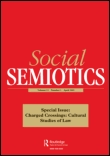
Social Semiotics
Bridging Disciplines: Language, Culture, and CommunicationSocial Semiotics, published by Routledge Journals, Taylor & Francis Ltd, is a leading academic journal dedicated to the dynamic interplay of language, culture, and communication. Since its inception in 1991, the journal has showcased innovative research at the intersection of sociolinguistics, semiotic theory, and cultural studies, offering critical insights into how meanings are constructed and conveyed in various socio-cultural contexts. As a testament to its academic rigor, Social Semiotics holds a distinguished position in the 2023 category quartiles, achieving Q2 in Communication, Q1 in Cultural Studies, and Q1 in Linguistics and Language. Furthermore, its exceptional Scopus rankings place it in the top tiers of its fields, with notable percentiles across multiple categories, making it an essential resource for researchers, professionals, and students alike. Although currently not open access, the journal's articles are widely considered pivotal for understanding contemporary issues in communication and cultural theory. For those engaged in the study of semiotics, Social Semiotics remains an indispensable platform for scholarly dialogue and advancement.

SCHWEIZERISCHES ARCHIV FUR VOLKSKUNDE
Celebrating the Diversity of Cultural HeritageSCHWEIZERISCHES ARCHIV FUR VOLKSKUNDE, with ISSN 0036-794X, is a vital resource for scholars and practitioners in the fields of Arts and Humanities and Cultural Studies. Published by G KREBS VERLAGSBUCHHANDLUNG AG in Switzerland, this journal plays a crucial role in advancing the discourse surrounding folk culture, traditions, and anthropology. Despite its current ranking in the Q4 category for both Arts and Humanities and Cultural Studies, the journal serves as an essential platform for disseminating unique research findings and insights, contributing to a well-rounded understanding of diverse cultural practices. Researchers, professionals, and students are encouraged to explore the rich content produced between 2008 and 2014, and from 2017 to 2023, which reflects a commitment to fostering a multidisciplinary approach to folklore studies. By addressing the complexities of cultural dynamics, the journal not only promotes scholarly engagement but also enriches the academic community’s appreciation of folk traditions.